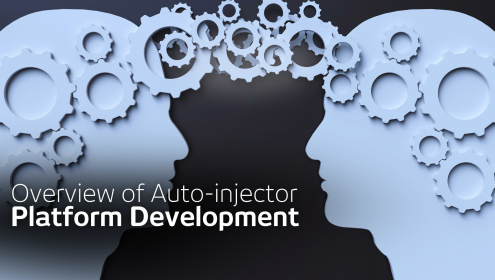The Day That COVID-19 Dies
Ilan Shopen | 10.08.2020

Can you imagine that one day the coronavirus will be history, a creepy story to tell your grandkids? Anxiety is becoming more prevalent as the crisis stretches on, as are negative feelings such as uncertainty and loss of control, which prevent us from understanding that this difficult time will soon become a chapter in the history books.
In the healthcare industry, the story we’ll tell is a different story. It’s at times like these that we truly see the importance of the healthcare industry, which is persisting against all the odds, maintaining routines and providing the essentials to healthcare systems, as well as focusing on how the “day after” will look — The day that COVID-19 dies.
This crisis has made it clear that the trends towards homecare, improved patient compliance and quality of care utilizing self-administered therapy, and a growing awareness of the environmental impact of products as well as the associated costs will drive the development of solutions that meet these needs.
Home care integrates patient care with the various activities of daily living. A balanced approach to tomorrow’s healthcare involves developing solutions that enable as much patient care as possible in a home environment. This requires an approach that is not only limited to clinical need, but takes a more holistic view of patients’ lives and an understanding of their physical and emotional environments.
COVID-19 has demonstrated how much our lives is dependent on others. Our needs and desires have to be balanced with our responsibility to the world around us, not only as individuals but also as companies and countries. The pharmaceutical industry has to contribute its part to this global effort.
Developing products to meet end user needs
When we commenced the development of Flexi-Q platform for our mechanical auto-injectors, we started with the end user’s physical and emotional needs, focusing on user populations that represent the most challenging cases of physically and motor disabilities, while still being able to self-inject.
These populations included those being treated for rheumatoid arthritis and Parkinson’s disease, as well as the elderly and infirm.
Once we’d analyzed and defined the needs of these patients, we began the process of developing a mechanical design which meets their needs, while also ensuring the design addressed required characteristics of quality and reliability. This approach to device development has resulted in a unique design for an easy-to-use self-injection device platform which also meets Elcam’s stringent quality requirements.
Based on this mechanical auto-injector platform, we’ve developed the Flexi-Q family of products, including Flexi-Q PFS, Flexi-Q DV, Flexi-Q eAI and Flexi-Q mMU devices. Flexi-Q PFS was initially launched on the market as a combination product incorporating a blockbuster biologic molecule; its outstanding reliability and high degree of satisfaction in its ease of use has provided E3D and its customers with considerable confidence in the other Flexi-Q products.
One example is E3D’s Flexi-Q-mMU (multi-use mechanical auto-injector) which combines a reusable device with a disposable, single-use cassette with a standard pre-filled syringe (PFS). The simple design of the single-use cassette is based on a minimal number of plastic components, ensuring that Flexi-Q mMU has a very low cost per injection, whilst providing all of the advantages associated with fully disposable, pre-loaded auto-injectors.
Flexi-Q-mMU is designed with patient compliance at the forefront due to its ease to use — with just one additional preparation step when compared to a fully disposable auto-injector. All the user has to do is to insert the cassette into the device. From this point on, Flexi-Q mMU offers all of the functionality of a three-step fully disposable auto-injector, forming a cost-effective and reusable system.
It’s important to note that studies performed with Flexi-Q mMU were carried out with multiple populations of different ages, clinical conditions, and physical limitations. The results were taken into account during the design process, thereby ensuring a high degree of usability. The studies demonstrated that the additional user step was easy to perform, and did not result in any discernible dissatisfaction among users.
Three Easy Steps: Quick, Simple & Safe
Once prepared, the Flexi-Q mMU user steps are:
1. Pull off safety cap (which removes the needle shield from the PFS)
2. Press the device’s skin sensor against the injection site
3. Press the INJECT button
Due to a dual-activation mechanism, injection can only take place when both the skin sensor and the inject button are activated – providing a built-in safety feature to prevent unintended injection. Safety is further enhanced as the device only automatically starts the injection after the automated insertion of the PFS needle is fully completed. Flexi-Q mMU can be configured to deliver either the full contents (from 0.1 ml to 1.0 ml) or a partial volume from the PFS.
Users receive audible signals at the start and end of the injection process and a viewing window also allows progress and completion of the injection to be visually monitored.
In order to address patient’s injection anxieties, the needle is hidden at all times before, during, and after the injection. Following the injection, as the auto-injector is lifted from the skin, a needle shield is automatically activated, providing passive needle safety. The cassette partly ejects, allowing for simple and safe removal and disposal.
Among Flexi-Q mMU’s other characteristics, is its quiet injection process. Injection speed can be configured within the design and assembly stages to further reduce anxiety and perceived pain. The disposable cassette’s total material mass is around one quarter of that of a typical disposable auto-injector. With the small amount of plastic used in its production, Flexi-Q mMU represents an environmentally friendly solution. The disposable cassette design can be customized to incorporate standard glass or plastic PFS from a range of manufacturers and offers a minimal footprint for manufacture and delivery, with a correspondingly low storage and waste volume at a patient’s home.
Because the reusable device has a three-year shelf life (based on two injections per week) E3D estimates that the total cost per injection for Flexi-Q mMU is typically 80% less than the injection cost of a disposable auto-injector.
Biologics and biosimilar drugs are typically composed of fragile proteins which require injection to obtain the desired therapeutic effect. When such drugs are prescribed for people with chronic diseases such as RA and diabetes (which require frequent doses for treatment success), reusable auto-injectors offer a very economical alternative to fully disposable devices.
In summary, when the coronavirus pandemic is behind us, a greater emphasis will be placed on three existing trends that drive drug delivery system development, in addition to increasing the commercial value (and lifecycle) of drug products. Those trends are improved patient compliance and quality of care, growing awareness of production footprint and associated costs, and increased use of self-administered drug therapy which (represents a step towards precision medicine). All these trends will bring the Flexi-Q mMU auto-Injector to the forefront the day after COVID-19 dies.






